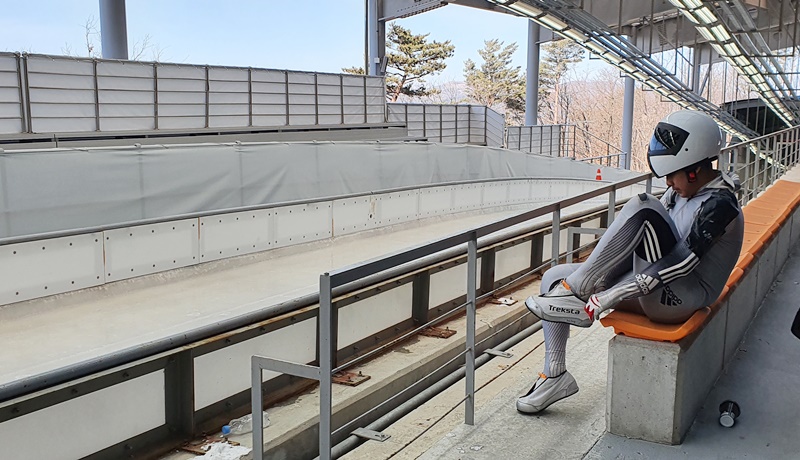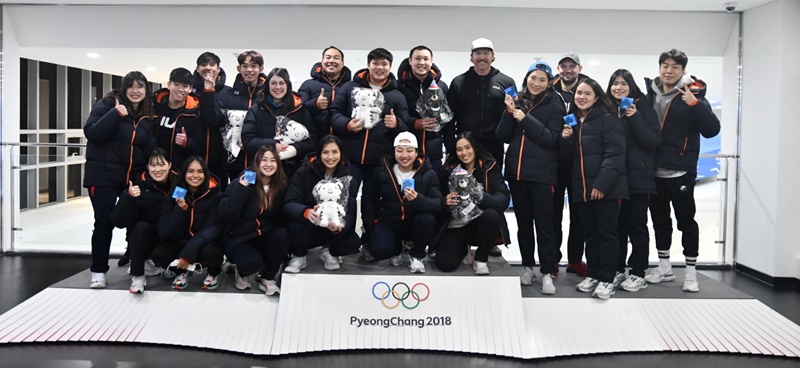By Lee Kyoung Mi and Lee Hana
Video = Choi Taesoon, Lee Haneul
Pyeongchang-gun County, Gangwon-do Province | Feb. 23, 2021
Nguyen Van Khanh, a Vietnamese skeleton athlete, took a deep breath while standing behind the starting line at the Alpensia Sliding Center. Picking up speed with a running start, she hopped on her sled to speed across 1,400 m of track at 100 kph in the blink of an eye.
Korea.net on Feb. 23 visited the center in Daegwallyeong-myeon Township of Pyeongchang-gun County, Gangwon-do Province, where training for the skeleton and bobsled events was underway.
Among the athletes were a few who seemed a bit hesitant to remove their padded jackets for practice. Hailing from Vietnam, Cambodia, Malaysia and Thailand, these prospects were selected to train in Korea as part of a project to foster sledding champions from abroad sponsored by the Ministry of Culture, Sports and Tourism, Gangwon-do Province and the PyeongChang 2018 Legacy Foundation.
Part of the legacy left by the PyeongChang 2018 Winter Olympics and Paralympics, the program aims to foster bobsled and skeleton athletes from nations targeted by Seoul's New Southern Policy to field in the 2022 Beijing Winter Olympics.

Cambodian skeleton athlete Srey Reachboth, looking both nervous and excited, on Feb. 23 gets ready to hit the ice at the Alpensia Sliding Center in Pyeongchang-gun County, Gangwon-do Province. (Choi Taesoon)
A combined 14 athletes from countries with climates too hot for winter sports from October last year began arriving in Korea. Though the COVID-19 pandemic presented hurdles in getting their visas, the sports ministry and the Ministry of Foreign Affairs as well as quarantine authorities gave their full support. After finishing self-quarantine, the athletes now train around the clock.
Though used to their sleds and training on the course, they first learned about skeleton and bobsledding in Korea. With guidance from their Korean coaching staff, they have trained and acclimated to the freezing weather, improving their skills every day.
Khanh, who looked as excited as a child on his first rollercoaster ride while sliding down the racetrack, is from Vietnam.
"Korea is very cold, unlike Vietnam, where it's very hot. Training to adapt to the different climate is very important. I like Korean food, traditions and culture, and the people, too. I hope to achieve a good result to make my country Vietnam and all my coaches proud," she said.

Fourteen athletes from four Southeast Asian nations -- Vietnam, Cambodia, Malaysia and Thailand -- are training for next year's Beijing Winter Olympics in Pyeongchang-gun County, Gangwon-do Province. Field and track, weight training and sledding are all part of their training. (Pyeongchang 2018 Legacy Foundation)
Malaysian skeleton racer Jonathan Yaw said, "Competing at the Olympics is a hard goal to reach, but I'll do my best when given the chance. After 2022, I want compete in the skeleton category at the Winter Olympics in Italy in 2026."
Competing at next year's Winter Olympics is the immediate goal of these athletes. Their progress and skills will be put to the test from March 9-25 at the 2021 Korea Cup Bobsleigh and Skeleton in Pyeongchang-gun.
The International Bobsleigh and Skeleton Federation sanctioned the competition, giving Korea the green light to host it. The pandemic has prevented these athletes from entering global competitions over the past year. Thus the event will give the athletes a chance to gain experience and compete in races that could earn them berths in the Beijing Olympics.
An organizing staff member of the Korea Cup called the competition "the first international race that Southeast Asian athletes will compete in since beginning their training" and "a great chance to put their skills to the test."
Following the event, the athletes will return to their home countries late this month to rest for a few weeks. A second round of training will begin in May and June.
Jang Jin-sang, secretary general of the PyeongChang 2018 Legacy Foundation, said, "When Korea won the bid to host the Winter Olympics in Pyeongchang, it pledged to the IOC (International Olympic Committee) and the international community to contribute to the global development of winter sports. To keep this promise, we will continue using our Olympic facilities and promote winter sports."
Three years ago, Pyeongchang-gun, host of the 2018 Winter Olympics, warmed the hearts of people around the world. The event's legacy lives on through the passion of a new generation of winter sports athletes.
Just like in the 1993 film "Cool Runnings," based on the real-life Jamaican track and field athletes who represented their country in bobsledding at the 1988 Winter Olympics in Calgary, Canada, the Southeast Asian racers in Pyeongchang-gun are also eyeing the glory of competing on the Olympic stage.
km137426@korea.kr